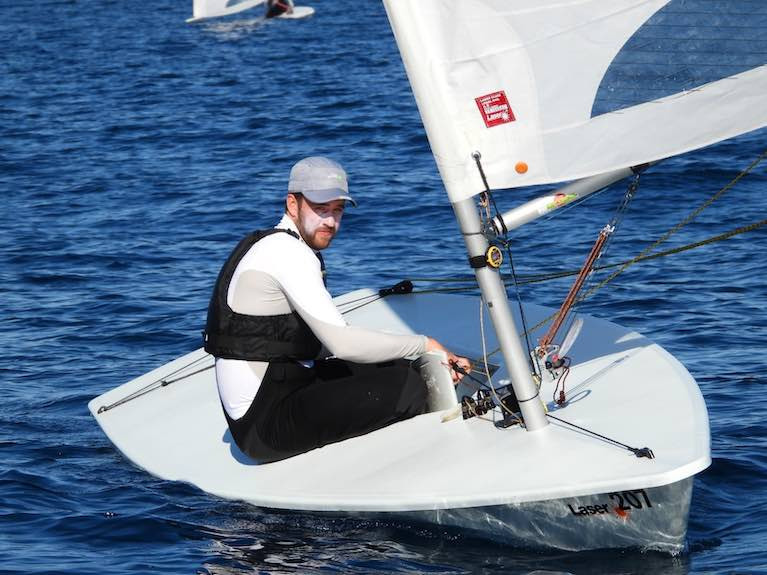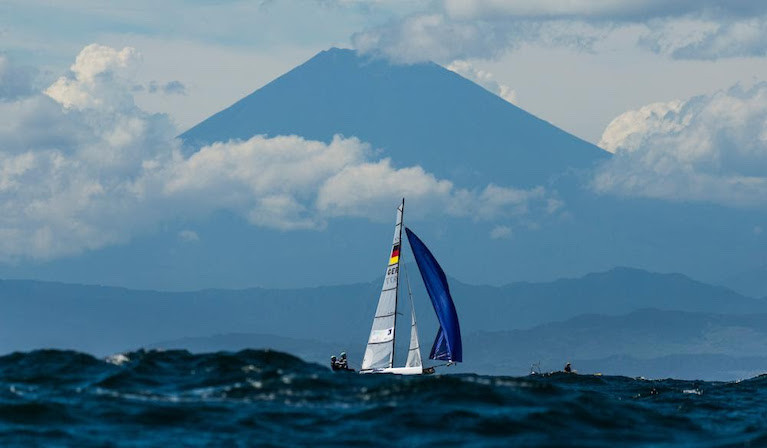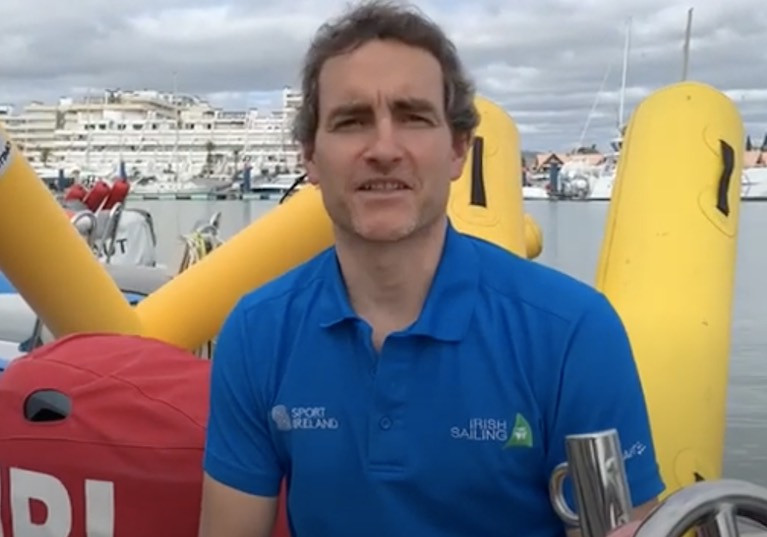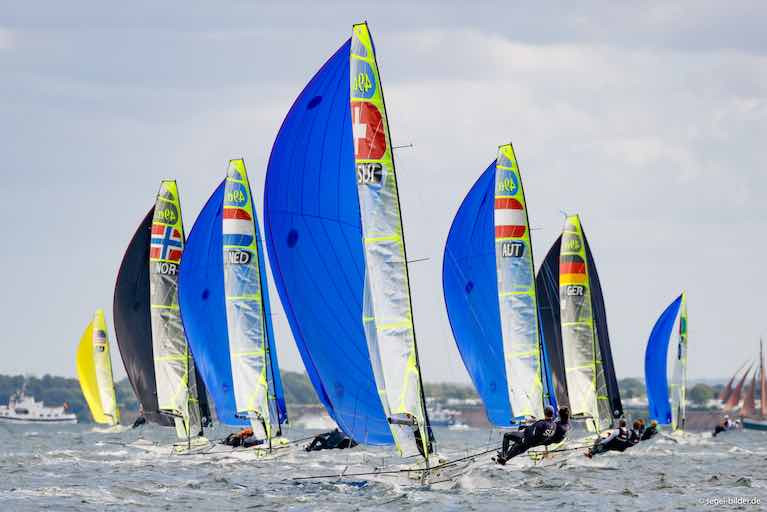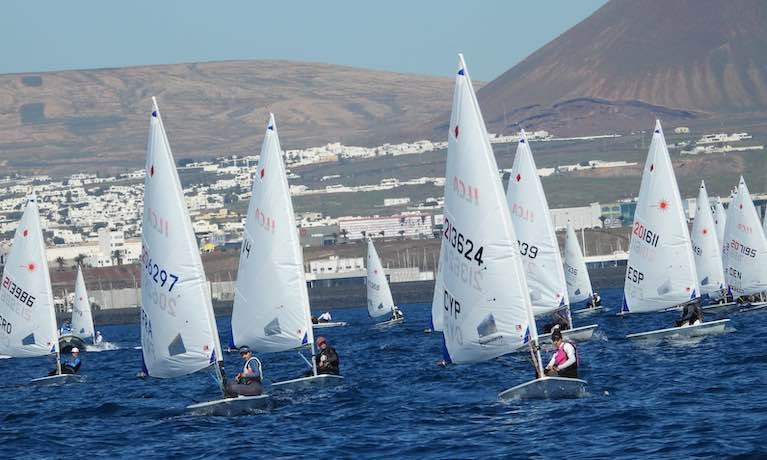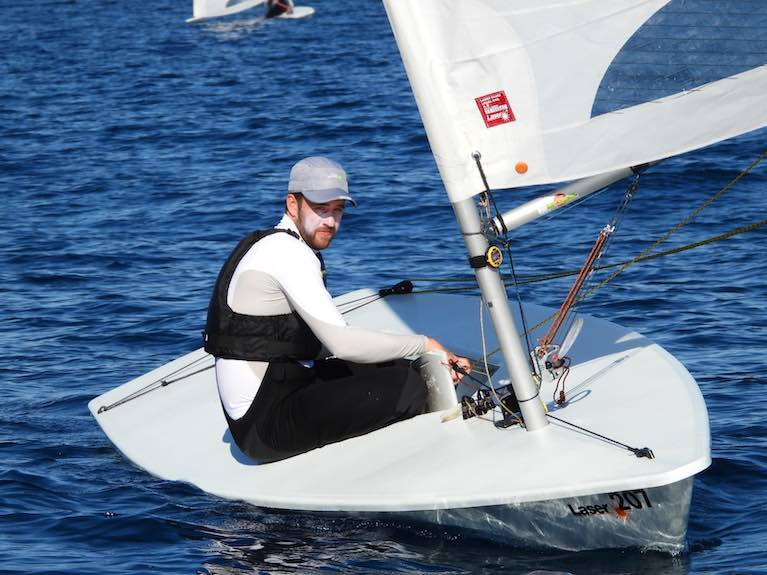Displaying items by tag: Tokyo 2020
Two Irish 49er teams have their date with Olympic destiny in just a week's time when the final Tokyo qualifier takes place next week on the Spanish Island of Lanzarote.
One way or another, Sunday week (March 21st) will mark the culmination of five-year campaigns for two Irish 49er teams, bringing the curtain down on an eventful cycle for the Olympic skiff in Ireland.
The hope is that Ireland can be top of the unqualified European nations and win the one remaining slot. The key contenders are Ireland, Italy, Belgium, Sweden, Estonia and Russia.
The ad hoc 'Lanzarote International Regatta' event was announced a month ago after the Princess Sofia Regatta was postponed. It gave the teams a month to arrive and prepare for the event, removing some of the uncertainty in Olympic circles caused by COVID-19.
 All Ireland duo - Belfast Lough double Olympian Ryan Seaton is teamed with Cork Harbour's Seafra Guilfoyle
All Ireland duo - Belfast Lough double Olympian Ryan Seaton is teamed with Cork Harbour's Seafra Guilfoyle
Youth v Experience
It will be a case of youth versus experience for Ireland in the Canaries. As Afloat reported previously, double Olympian Ryan Seaton teamed with Seafra Guilfoyle battle against 2018 Under 23 49er World Champions Robert Dickson and Sean Waddilove, in their first Olympic campaign. Both are chasing the single elusive Olympic place and whoever grabs it will be deemed to be nominated to the Olympic Federation of Ireland for Tokyo in July.
49erFX
Ireland will have no role in the 49er FX women's class in Lanzarote as Annalise Murphy and Katie Tingle quit their skiff campaign in 2019 and Murphy went on to secure the nomination in the Radial class, so far the only Irish boat for the Tokyo regatta.
There is no entry list published for Lanzarote so far but it may see Dun Laoghaire Harbour's Saskia Tidey in action for Team GB. The Royal Irish sailor who is tipped for a medal in Tokyo opted to sail for Team GB after Rio citing 'lack of opportunities' for her at home.
After so much doubt over its final Olympic qualifying event, the men's Laser class has been confirmed for the 17-24th April in Vilamoura, Portugal.
As Afloat previously reported, this is the last chance for the Irish Laser Men to qualify with two nation places up for grabs.
Representing Ireland will be Rio rep Finn Lynch of the National Yacht Club, Liam Glynn of Ballyholme in Northern Ireland and Ewan McMahon of Howth Yacht Club.
For Ireland to qualify, an Irish sailor has to finish in the top two of those European countries that have yet to qualify.
The main contenders for these slots are Italy, Spain, Belgium and the Netherlands.
Following this week’s cancellation of the French Olympic Week, in Hyères, of which the Finn Open and U23 European Championships was included, the International Finn Class has accepted an offer from the Vilamoura Sailing Center to host the event over the same dates, which remain 10-16 April.
The event is a crucial competition ahead of the all-important Finn Gold Cup, three weeks later in Porto in northern Portugal, which is the final continental qualifier for the Tokyo 2020 Olympic Games, where the last places for Africa and Europe will be decided.
With many sailors training over the winter in Lanzarote or Cadiz, Vilamoura was a logical option to limit further travel around Europe in these uncertain times. Vilamoura will also provide excellent preparation for the many sailors still trying to qualify their country for Tokyo, with similar conditions and the same format.
The Finn class feels very fortunate to have had a number of high quality offers to help out and stage the championship at such short notice, including the Andalusian Sailing Federation Training Centre in Cádiz, Spain, which also held the 2018 European Championship.
Balazs Hajdu, President of the International Finn Association commented, “We are very grateful to all those who offered to host our Europeans at short notice and are very happy to accept the proposal from Vilamoura in what is a very important period for many Finn sailors as they prepare for the crucial Finn Gold Cup in nearby Porto.”
“For the team in Vilamoura to put together a championship of this importance in just a few days gives us confidence that our sailors will have a great and fair championship.”
The class is eagerly looking forward to its first visit to Vilamoura since the highly successful European Championship in 1998.
Hyeres Regatta, Semaine Olympique Francaise is Cancelled
Coming a few months before the Tokyo Olympic Games, the Semaine Olympique Francaise in Hyeres was to be the key event for Olympic sailing but it has been cancelled due to COVID-19.
In particular, it was the final regatta for Olympic selection in the Laser class where Ireland is seeking a Tokyo berth.
No replacement regatta for Hyeres has so far been announced as the clock ticks down to the Olympics in July leaving a question mark over what next. As Afloat has previously reported, there are a number of scenarios likely to play out here
For almost a year, the organising committee of the Semaine Olympique Francaise has designed and developed many measures to welcome the elite of Olympic sailing in the safest conditions possible. All scenarios were considered and proposed to the DIGES (France's inter-ministerial delegation for major sporting events), but unfortunately, they have not given their permission and the event will not be able to take place in April.
Several different series had been planned to make the Hyerois event the highlight of the season. The Finn class had planned to award their European title there, the RS: X their World Champion title, and the Laser the last four European quotas for the Olympic Games. This historic event, one of World Sailing's World Cup events, was initially to be held from April 17 to 24, before a new version scheduled over four weeks was proposed to meet the health constraints governing physical distancing between people.
"We made the difficult decision to cancel Hyeres's 2021 Semaine Olympique Francaise following the response from DIGES," Nicolas Henard, President of the FFVoile (France's sailing federation), said. "We studied all the ways we could guarantee an event that would respect health standards and guarantee all the athletes attending watertight health and safety. We hoped that this event, focused on sailors engaged in an Olympic programme, would obtain the necessary agreements, especially after re-planning it over four weeks. But at this point, due to the ongoing health crisis, we cannot hold this event.
The focus of the organising committee is now on the 2022 edition, and with Toulon Provence Mediterranee and World Sailing as partners, they will prepare an exceptional event from April 23 to 30. It will be an international competition even more notable for hosting the new Olympic disciplines for "Paris 2024".
'Tokyo 2020 Olympic Games Firmly on Track' - World Sailing
World Sailing’s preparations for the rescheduled Tokyo 2020 Olympic Games are firmly on track following discussions with the International Olympic Committee (IOC), the Tokyo 2020 Organising Committee and the Summer Olympic International Federations to ensure the Games proceed in a safe environment for the athletes, officials, locals and spectators.
So far one Irish sailor has been nominated to participate in Tokyo, and that is Rio silver medalist Annalise Muphy in the Laser Radial class. Two other Irish boats are scheduled to compete for the last nation places in both the 49er skiff and the men's Laser in March and April respectively
In order to safeguard the Games, the IOC, International Paralympic Committee (IPC) and Tokyo 2020 have taken proactive steps to produce a robust series of Playbooks which outline the responsibilities of all Games participants – Federations, Press, Broadcasters, Athletes and Officials - and the rules that must be followed to ensure the Games remain safe.
The Playbooks have been developed jointly by the IOC, the IPC and the Tokyo 2020 Organising Committee and are based on the extensive work of the All Partners Task Force, which also includes the World Health Organisation, Government of Japan, Tokyo Metropolitan Government, independent experts and organisations from across the world.
The Playbooks can be viewed and downloaded here.
To further underline the safety-first approach to the Games and reassure all International Federations that the Games will be going ahead, Tokyo 2020 Sports Director, Mikako Kotani, and IOC Sports Director, Kit McConnell, recently led a detailed briefing and Q&A session to discuss the protocols and strengthen COVID counter-measures.
World Sailing President, Quanhai Li, commented, “World Sailing is fully committed to adapting and working with the IOC, the Tokyo 2020 Organising Committee and Japanese authorities to ensure a safe and successful Olympic Games. We thank the Olympic Family, the IOC and our friends from Tokyo 2020, for their ongoing efforts in organising a safe Olympic Games.”
David Graham, Chief Executive Officer, added, “This joint mission to hold the Games safely embodies the values of the Olympic Games through courage and determination. With the eyes of the world on Tokyo 2020 to deliver an uplifting, inspiring and spectacular Games, the International Federations appreciate the positive approach, commitment and dynamic leadership of IOC, ASOIF and Tokyo 2020 to safeguard the event and prioritise the health and wellbeing of everyone involved.”
Alastair Fox, Director of Events, commented, “The emphasis on safety at the Olympic Games Tokyo 2020 will mirror the safe ‘bubble’ environment that major sports around the world have created over the past year to keep athletes, coaches, officials and media personnel safe. It has been proven to work and we are confident that this year’s Olympic Games will be an incredible success.”
World Sailing and all of the Summer Olympic International Federations have been in regular communication with IOC President Thomas Bach, the IOC Sports Department and Tokyo 2020 regarding safety procedures. The comprehensive safety plan will be strictly enforced and President Bach informed attendees that while it is not obligatory for athletes to take the vaccination, he strongly urges them to do so.
Tokyo will welcome 350 sailors from 60 nations to race across the ten Olympic sailing events on Sagami Bay in Enoshima, Japan. Despite the delay, sailors around the world have maintained focus and sharpness by continuing their preparations with training camps and competitions as the clock ticks down to the first event on 23 July 2021.
Andrew Lewis of Trinidad and Tobago qualified for his third Olympic Games just over one year ago at the Hempel World Cup Series Event in Miami. After a period of training in his home country, Lewis will head to the Canary Islands, where he had previously completed a training camp, and remain there before travelling to Japan.
Like all of the sailors preparing, Lewis has high hopes for Tokyo 2020, “Seeing many, many other big sports creating bubbles, creating environments that are safe, has proven over and over, since the pandemic started, that it is possible.
“I am in full support of the Olympic Games happening and I know that the International Olympic Committee and the country of Japan have the ability to shine and showcase to the world a light at the end of the tunnel.”
Royal Irish 49erfx Crew Saskia Tidey to Speak about Her Road to Tokyo with Team GB at RYA Dinghy Show
49erfx crew Saskia Tidey from the Royal Irish Yacht Club in Dun Laoghaire Harbour will be among the British Sailing Team’s Tokyo 2020 athletes attractions at the RYA Dinghy Show as it goes virtual for the first time over the weekend of February 27 and 28.
They’ll feature within two days of talks, demonstrations and coaching sessions from some big names in sailing.
As regular Afloat readers will know, Tidey sailed for Ireland in Rio four years ago before deciding to move to Team GB for Tokyo 2020 due to lack of opportunities at home.
With just five months until the rescheduled Tokyo 2020 Olympics is set to begin, Tidey and the team will take visitors behind the scenes of the Olympic campaigns.
Taking to the main stage, reigning 470 Olympic and world champion Hannah Mills will be chatting with show host Hannah Diamond about her preparations for Tokyo 2020 and revealing how she’s dealt with the challenges over the last year.
In a separate session, Team GB 49er sailors Dylan Fletcher and Stu Bithell will be joined by Olympic test event 49erFX class runners up Charlotte Dobson and Saskia Tidey to talk about their roads to Tokyo 2020.
For windsurfing fans, BST coach Sam Ross interviews Team GB RS:X stars Emma Wilson and Tom Squires, plus Olympian Dave Hackford joins them to discuss the new watersports – including wing foiling – that have taken off in the UK.
iQFOiL athlete Saskia Sills talks sustainability with The Green Blue’s Kate Fortnam, looking at how all water users can ‘protect their playground’, while Stu Bithell will make his much-anticipated return to the microphone to provide commentary for the eSailing Winter Club Championship.
Meanwhile, RYA Racing Director Ian Walker will hear from Rio 2016 Nacra 17 gold medallist Santiago Lange, London 2012 Laser Radial gold medallist Xu Lijia, 1984 Finn gold medallist and America’s Cup star Russell Coutts and double gold medallist Shirley Robertson.
Over in the Knowledge Zone, two-time Olympian Ali Young will be joined by her fellow Tokyo 2020 Team GB ILCA sailor Elliot Hanson and European Championship bronze medallist Lorenzo Chiavarini to reveal their top racing tips.
British Sailing Team meteorologist Simon Rowell returns for another of his hugely popular talks about weather. For those interested in race strategy, top tactician Mark Rushall will disclose his secrets for getting round the course quicker.
And British Sailing Team performance psychologists Suze Burton-Wylie and Chelsea Orme will reveal how to stay calm on the start line in their talk, Decision Making Under Pressure.
The full Dinghy Show schedule is online.
With 'Uncertainty in the Air', Irish Olympic Sailors 'Plough Ahead' for Tokyo 2021
Irish Olympic Sailing boss James O’Callaghan was in climes sunnier than the team’s Dun Laoghaire Harbour Olympic Sailing HQ when he reported back to the Olympic Federation of Ireland last week on successful results achieved at January's training regatta in the Canary Islands.
As Afloat reported previously, Annalise Murphy took fifth overall in the ILCA Six class and Finn Lynch seventh in the ILCA Seven class at the Lanzarote Winter Series, a regatta that grew in significance in the pandemic. As the international calendar is disrupted for a second year, the January event gave Murphy, Lynch and other Irish campaigners the chance to be back on the race course for the first time since October's European Championships in Poland.
It is reported that conditions in Lanzarote are very similar to those the sailors will face in Hiroshima, Tokyo, where the sailing events of the next Olympic Games will be held in late July. So much so, that even Japanese teams have decided to change their home for the Canary Islands to prepare for the big event. "Lanzarote is very similar to Hiroshima, with a lot of wind and big waves. Moreover, here we have sun, good weather every day and a lot of activities that allow us to prepare ourselves outside of the water as well. That is why we decided to come to the Canary Islands," says Eri Hatayama, a Japanese Nacra 17 sailor.
The Team Ireland Performance Director for Sailing said it was a ‘great opportunity to continue the training’ and to 'keep the sailors busy and focussed on the job'.
O’Callaghan said there was some ‘uncertainty in the air’, as the Olympic circuit was curtailed by COVID. It's a situation made even more uncertain by the fact that Ireland has only one boat qualified (Laser Radial/ILCA Six) for Tokyo so far. The two other berths Ireland still seeks are totally reliant on Euro qualification regattas, one of which was postponed last week.
Having missed earlier qualification chances as far back as 2018 Ireland’s chances are now tied to the onset of the pandemic across Europe and the hope that the remaining places can be settled by racing rather than historical results as the staging of the Games itself comes under scrutiny.
For the moment, O'Callaghan says he is 'ploughing ahead' with team plans.
See the youtube clip below.
Annalise Murphy's Lanzarote Winter Regatta
Meanwhile, the National Yacht Club's Murphy has given her own candid assessment of her Canary Island performance on social media.
In an honest review, uncomplicated by coach-speak, the Rio medalist declared "I am very happy with some aspects of my sailing but somehow I can still be a total idiot when racing, even though I feel that at 30 years of age I should be making less stupid mistakes!"
She signed off the Instagram self-appraisal by thanking the host club and congratulating Denmark's Anne Marie Rindom on her Lanzarote victory, a sailor Murphy beat in Rio to win Olympic silver four years ago.
With Palma in the Balance, Hopes Are That Final Olympic 49er Berths for Tokyo Can Be Settled on the Water
The hope is that racing will decide the final Olympic berths in the 49er class in which Ireland is one of four countries hoping to progress to Tokyo but uncertainty surrounds this as COVID threatens to cancel the Princesa Trofeo Sofia qualification regatta in Palma de Mallorca, now just 56 days away.
Ireland is vying with Belgium, Sweden and Italy for the one remaining European place. Ryan Seaton and Seafra Guilfoyle and Robert Dickson and Sean Waddilove both chasing the elusive Olympic place for Ireland. Form at the 2020 Worlds suggested that Irish sailors would be favourites having finished ahead of the other three candidates.
Palma 2021 decision
Insiders are saying a decision on Palma is expected next week as organisers on the Spanish island look at options to separate the fleets into two shifts per day in order to keep a maximum number of sailors below the limit Spain sets for gatherings but that's easier said than done at a regatta that regularly attracts 1500 sailors from 30 countries or more.
Already the Abu Dhabi qualifier for the Asia and African qualification is cancelled and participants there say efforts are being made to see if Oman can host an alternative regatta in March.
In Europe, if Palma is cancelled there is no 'Plan B' as such, other than to try and redesignate the Olympic qualifier at France's Hyeres Regatta in April or the 49er European Championships in Greece, just two months ahead of the Games itself.
Historical results
If all that fails, World Sailing has said it will rely on historical results to decide the final berths as Afloat previously reported here.
It's all a long way from where everyone hoped they would be in 2021 in this fight against the pandemic.
Fifth for Annalise Murphy at Lanzarote's ILCA 6 Winter Regatta
Annalise Murphy, Ireland's only sailor qualified for Tokyo so far, dropped back to fifth overall at the end of the ten race Lanzarote Winter Series Regatta today, having held second overall in the ILCA 6 fleet until the penultimate day.
Lighter conditions did not suit the Dun Laoghaire Olympic silver medalist who had an ultra-consistent opening seven-race results of 3, 2, 2, 2, 1, 6, 4 before counting a 33, 17, 19 and 20.
Counting six race wins in her tally, Anne Marie Rindom of Denmark topped the training regatta and was followed home by 2017 Under-21 world champion Maria Erdi of Hungary. Third was Vasileia Karachaliou of Greece.
Murphy's training partner, 16-year-old Eve McMahon of Howth Yacht Club was 24th in the 40-boat fleet.
Results here.
On the Pace Finn Lynch Sixth In Lanzarote's ILCA 7 Fleet
The National Yacht Club's Finn Lynch recovered to a strong sixth from his ninth overall position going into the final day of racing in the ILCA 7 (men's Laser) fleet of 31 boats at the Lanzarote Winter Series Regatta today.
After ten races plus today's light air medal race, the Rio Olympian ended the training regatta some 17 points off fifth overall but ahead of Dutch sailor Duko Bos, and Switzerland's Eliot Merceron both main rivals for one of the final Tokyo qualification berths.
Race win for Tom Higgins
The regatta saw a return to the water for Royal St. George's Tom Higgins after an absence of two days and a what a return he made, winning race ten of the series to beat among others Brazilian legend Robert Scheidt. Scheidt, the holder of two gold medals, two silver medals and a bronze from five Olympic Games, finished second overall to France's Jean-Baptiste Bernaz.
Howth Yacht Club's Ewan McMahon who lost a day due to injury finished 26th.
The regatta takes the Irish men's Laser team a step closer to Hyeres Regatta in April where there are two final Olympic spots available at the planned European Sailing Cup. Up to six countries are in the running – Slovenia, Switzerland, Spain, Netherlands and Belgium and Ireland with Ireland finishing behind all of these at the latest World Championships but, significantly, top of those competing this week in Lanzarote.
Results are here



























